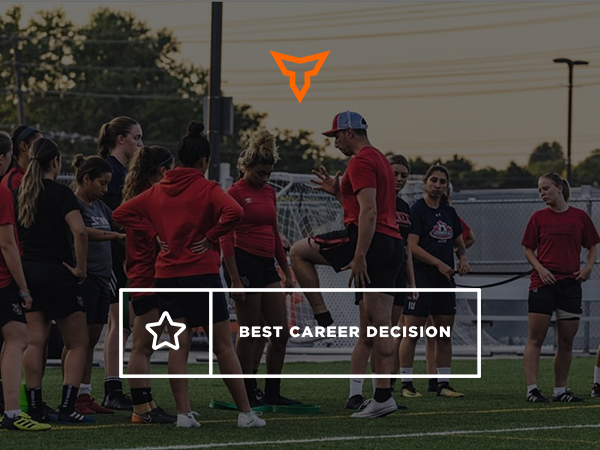Networking, Applying, & Interviewing: Key Skills for Every Strength Coach
Strength and conditioning can be a fickle and sinister profession. The old adage goes “If you haven’t been fired, you haven’t coached long enough.”
Many great strength coaches find themselves jobless for a myriad of reasons, and a lot of those reasons are outside of their control. This can be an intimidating reality when you are responsible for the well-being for someone outside of yourself, such as your wife and kids. You see many great coaches consistently land on their feet after losing a job and you must ask, “how?!” Great coaches have three key skills that allow them to remain constant in our field: Networking, Applying and Interviewing.
Networking: Expanding Your Circle
Audit Who You Already Know
Evaluate your current network! You may be surprised at who you already know and how you can leverage those relationships to create new ones. If you have a meaningful relationship with someone, more times than not they also believe you can have a meaningful relationship with others. Be an effective communicator to your current network on what your goals are, where you are currently at, and where you want to go in the field. Sometimes being a good coach is not about how big your network is, but how strong it is. It is not about who you know, but about who knows you.
Strategically Create Meaningful Relationships
The biggest mistake young coaches make when trying to create a relationship is only asking for favors instead of adding value first. You must give coaches a reason to contribute to your development by adding value to their lives and career. When approaching a coach that you do not know, a good piece of advice is to ask a specific question about something in the field (programming, plyometrics, administrative duties, exercise progression, etc.). Once you have asked that question, follow up and be consistent! I know if a young coach’s name continually pops up in front of me with meaningful discussion and questions, I am much more willing to contribute to that coach’s career. If a young coach reaches out to me one time and expects me to do all of the leg work to make them better, then I will be reluctant to help. Also, be patient and allow the relationship to unfold naturally. You cannot force a good professional relationship.
Applying: Pursue the RIGHT Job
Choose the Right Career Path
It is easy to say that we are not logo chasers, but I believe that we all were at one point or another in our careers. When looking for a job, make sure that you have full understanding of what job will fit your lifestyle best. It is easy to get caught up in the logo you will get to wear on your chest. Every job has a specific lifestyle that you must live in order to be successful. Make sure you do your research to find out what the lifestyle of that specific job is before you chase after it. Also, make sure your family dynamic is compatible with the job description you are signing up for. You do not want to find yourself having to battle between the happiness of your career and the happiness of your home life. This is a huge factor in so many great coaches leaving the field of strength and conditioning. Be mindful that wearing a popular logo on your shirt will only give you so much. These benchmarks are vital to your quest of finding your niche as a coach.
“It’s not about the money…” Yes it is.
Lots of coaches in this field pride themselves in frequently stating “we are not in it for the money.” Although this statement is mostly true, we must first understand that money is important and always will be. When searching for the “dream job” we must not be afraid to ask what the position pays in relation to the job description and the cost of living in the area of the job. As much as we want to say, “it is not about the money”, in reality, being a good coach is a lot about the money. It is absolutely imperative to understand your net income when it comes to the cost of living in the area. For example, you may think you are receiving a $10,000 raise, but when the overall cost of mortgage, commute, moving cost, and other living expenses add up, it may not be as much as you think. All coaches must keep this in mind when pursuing another job.
Interviewing: Making the Right Impression
Prepare, prepare, prepare…
You have found the dream job that you want and have an opportunity to interview for the position. What do you do next? You must prepare for the interview just like you would prepare for an off-season. Everything you say and present will be a direct reflection on you as a person and as a coach. During the preparation phase, make sure that you have a crystal-clear understanding of your coaching and training philosophy. It is very important that you believe in yourself and your ability to do what you say you are going to do.
They Interview You, but You Also Interview Them
Once you have a clear and concise presentation of your coaching and training philosophies, you must reflect on the specifics you want to know about the job. This is the time to ask those questions! Interviewers want to hear your questions just as much as they want to hear your answers. This solidifies to the panel that you understand that being a good fit is a priority. This also gives you the opportunity to have a comprehensive picture of the job you are pursuing. Once you have that picture, you will be able to make the best decision for your family.
Be Impressive by Being You
During the interview, it is easy to get caught up in the mindset that you need to be more than you already are. This is a trick that your mind is playing on you! Remember, there are so many factors that are outside of your control during an interview process, so focus only on what you can control: how you dress, how you speak, and how you interact. Majority of interviews will be looking for the best fit for their specific program, not who has the most letters behind their name. Connecting on a personal level with the coaches, administration, and training staff will give you the best chance of landing the “dream job."
Read more about career development on the TeamBuildr blog:
3 Steps to Advancing Your Career as a Strength Coach
10 Survival Tips for the Independent Strength Coach
Strength and Conditioning Networking 101
Subscribe to our blog
Subscribe to receive the latest blog posts to your inbox every week.
Related posts

GRIT: Sometimes You Have to Suck It Up

From College to High School: A Strength Coach's Journey

